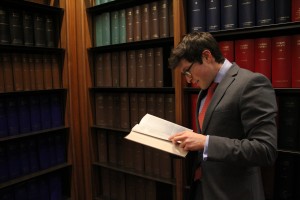A week in the life of a judicial assistant (Part 2): Jacob Turner, Judicial Assistant to Lord Mance
04 Friday Mar 2016
Jacob Turner, Judicial Assistant to Lord Mance Features
Share it
Read Part 1 here.
Wednesday
Today we hear the second and final day of arguments in Patel v Mirza. After the hearing is over, I work on a speech about the Court of Justice of the European Union which Lord Mance will be giving in a few months. Speechwriting is one of the most rewarding parts of being a JA. It involves a lot of unique research and it is a great opportunity to immerse ourselves in a completely new area. This year I’ve prepared speeches on subjects ranging from international arbitration to how the law should regulate artificial intelligence.
In the afternoon I visit Lord Mance to discuss a judgment he is writing. This is a fascinating area of the job, as we get to see the development of judgments which may end up being read decades in the future. Lord Mance chairs the Lord Chancellor’s Advisory Committee on Private International law, and in that context I spend some time this evening studying and preparing comments for him on the project for a global judgments convention which is under study by the Hague Conference on Private International Law.
Later, Lord Neuberger comes through our office to offer his avuncular wisdom on the day’s case and to share a few judicial anecdotes.
The Court is not sitting today, but judgment is being handed down in the joined criminal cases R v Jogee and R v Ruddock. As I come into the court, the news cameras are amassed outside. The courtroom is packed and there is a sense of fizzing anticipation in the crowd. Lord Neuberger reads the judgment. When he says that the law “took a wrong turn” in expanding joint criminal liability to those who merely foresaw another crime being committed by their accomplices, there is a palpable gasp in the chamber. Many are the families of those given mandatory life sentences under the previous law. After the hand down and court has adjourned, I look around me and see people bursting into tears, punching the air and hugging each other. Regardless of the result, this is a real example of the difference that Supreme Court judgments can make to peoples’ lives.
In terms of preparing for the announcement of such decisions, the JA of the Justice who has written the lead judgment will usually be asked to write a two-page “press summary”, which contains the essential facts, result and reasons given. We work closely with the UKSC Communications Team to explain difficult concepts into language which is accessible to journalists and the public (and probably law students) who may not have the time to read the full judgments, which can run to 50 or more pages.
Friday
The Court does not sit on Fridays and some of the Justices work from home. Although this is a working day, the JAs are not always required to come in. We have a football game every Friday lunchtime open to all of the staff (men and women). Despite repeated appeals we have not been successful in tempting any of the Justices to play. Occasionally there will be social events for the Court employees, which have included film showings, ice skating and quiz nights.
Usually I use Friday to read into the voluminous bundles for the following week’s cases. I am always struck by the incredible ability of the Justices to switch effortlessly between the different cases and judgments they are considering.
The JA role is intellectually challenging but I find the harder I work to understand a topic, the more rewarding I find it. Whether you are a barrister, solicitor or academic, there are innumerable exciting areas in which to be involved and the job offers a unique insight into the way in which complex legal and political issues are resolved. I would strongly urge anyone interested to apply.
About Jacob
Prior to becoming Judicial Assistant, Jacob was a solicitor-advocate in the London office of Cleary Gottlieb Steen & Hamilton LLP, where he specialised in international litigation and arbitration with a focus on sovereign clients. He previously worked as a law tutor at Oxford and King’s College London and at the Permanent Mission of Israel to the United Nations in New York, as a consultant legal advisor and speechwriter to the Ambassador. He studied at Oxford and Harvard Universities. Outside of the law, he enjoys playing sport and writing.
Interested in applying?
To meet the criteria for these appointments you must have a minimum of a 2:1 degree and be a solicitor, barrister or advocate qualified in one of the UK jurisdictions, having completed a training contract or pupillage by the start of the appointment. You will normally be intending to pursue a career in advocacy or have returned to university to carry out postgraduate research with a view to returning to a career in advocacy. You must demonstrate a high intellectual and analytical ability, incisiveness and the ability to work well under pressure.
The deadline for applications is 31st March 2016.
To apply or for further information please visit the Supreme Court’s website.



